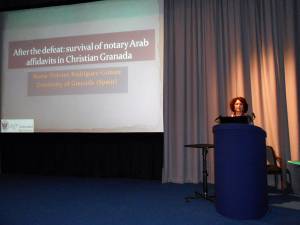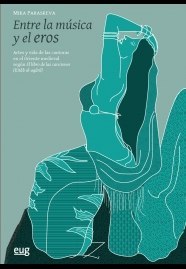| Participación de Mª Dolores Rodríguez Gómez en la Third Biennial Conference of the Society for the Medieval Mediterranean en Cambridge |
 |
 |
 |
|
La profesora María Dolores Rodríguez Gómez, miembro del Grupo CABEI ha participado en la Third Biennial Conference of the Society for the Medieval Mediterranean, Trade, Travel and Transmission in the Medieval Mediterranean, que ha tenido lugar en el Churchill College de Cambridge (UK), del 8 al 10 de julio de 2013.
Con el título de "After the defeat: survival of notarial Arab affidavits in Christian Granada" ha pretendido poner de relieve la permanencia de los actos legales durante los primeros años de dominio cristiano en el Reino de Granada. Esta supervivencia es evidente en las actas notariales granadinas de finales del siglo XV y principios del XVI, que fueron escritas en árabe y siguiendo los mismos esquemas que durante el período islámico, incluso cuando algunos de los que estuvieron implicados en esos actos jurídicos fuesen cristianos. Durante este tiempo, los conquistadores actuaban en materia contractual según una amplia tradición que comenzó el imam Malik b. Anas en Medina (siglo VIII). ABSTRACT: The Nasrid kingdom of Granada was the last surviving Islamic state in the Iberian Peninsula. Its domain extended for more than two centuries (1232-1492), during which time dominated the Maliki legal school (one of the four schools of Sunni Islam). The same legal school were established in North Africa, and there was frequent contacts between legal communities on both sides of the Mediterranean, thanks to the frequent questions and answers exchanged by their fuqaha', or through travel performed for various reasons. This paper aims to highlight the persistence of Islamic legal acts during the early years of Christian rule. This survival is evident in the Granadian affidavits of the late fifteenth and early sixteenth centuries, which were written in Arabic, following the same patterns as in the Islamic period, even when some of those involved in these legal acts were Christians. During this time, the conquerors governed in contractual matters according to the long legal tradition that started the imam Malik b. Anas (eighth century).
|



















